Related Research Articles
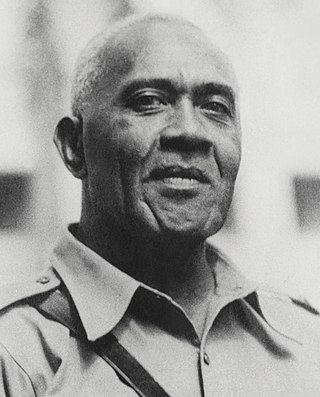
RatuSir Josefa Lalabalavu Vanayaliyali Sukuna was a Fijian chief, scholar, soldier, and statesman. He is regarded as the forerunner of the post-independence leadership of Fiji. He did more than anybody to lay the groundwork for self-government by fostering the development of modern institutions in Fiji, and although he died a dozen years before independence from the United Kingdom was achieved in 1970, his vision set the course that Fiji was to follow in the years to come.

Fiji is divided administratively into four divisions, which are further subdivided into fourteen provinces. Each province has a provincial council.
The House of Chiefs in Fiji consists of the Fijian nobility, composed of about seventy chiefs of various ranks, majority of which are related. It is not a formal political body and is not the same as the former Great Council of Chiefs, which was a political body with a prescribed constitutional role, although the membership of the two bodies did overlap to a great extent.
The culture of Fiji is a tapestry of native Fijian, Indian, European, Chinese and other nationalities. Culture polity traditions, language, food costume, belief system, architecture, arts, craft, music, dance, and sports will be discussed in this article to give you an indication of Fiji's indigenous community but also the various communities which make up Fiji as a modern culture and living. The indigenous culture is an active and living part of everyday life for the majority of the population.
The Provinces of Fiji are the 14 administrative units into which the country is divided, particularly in relation to the provision of resources and services to the indigenous Fijian population by the Fijian Affairs Board. They are more or less derived from the major clan affiliations for each provincial region.
RatuMeli Bolobolo was a Fijian chief and academic, who lectured at the Fiji Institute of Technology.
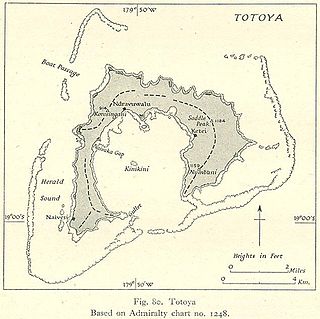
Totoya is a volcanic island in the Moala subgroup of Fiji's Lau archipelago. It occupies an area of 28 km2, making it the smallest of the Yasayasa Moala Group. Its maximum elevation is 366 metres above sea level. The main economic activity is coconut farming.
Nasaqalau is one of the eight villages on the island of Lakeba, in Fiji's Lau archipelago. The Yavusa Naseuvou includes four mataqalis, namely Dreketi, Loma, Nakabuta and Nautoqumu. Nasaqalau was also home to the first settlers on the chiefly island who were led by the Tui Lakeba as he continued his search for new land from Wainikeli in Taveuni.
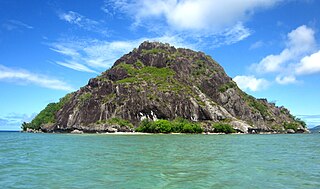
Ra is one of the fourteen provinces of Fiji. Occupying the northern area of Viti Levu, the largest island, it is one of eight Viti Levu-based Provinces. With a land area of 1,341 square kilometers, it had a population of 30,432 in 2017 census. The main urban centre is at Vaileka, with a population of 3,361 in 1996.

Lomaloma is a village at the south of the island of Vanua Balavu in the Lau archipelago of Fiji. The settlement is part of the tribal district of Tikina, Lomaloma and consists of 9 villages, 13 Yavusa (tribes), 42 Mataqali (clans), and 54 family units known as Tokatoka. The nine villages of Lomaloma Tikina are Lomaloma, Sawana, Susui, Narocivo, Namalata, Uruone, Levukana, Dakuilomaloma, and Tuvuca.
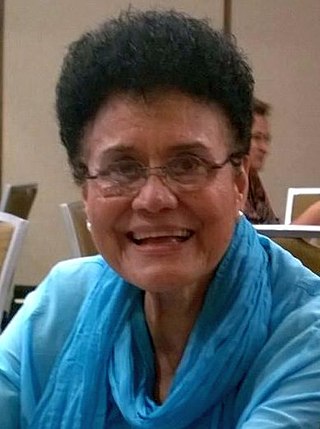
Adi Mere Tuisalalo Samisoni was a Fijian businesswoman and politician, from Lomaloma village on the island of Vanua Balavu in Fiji's Lau archipelago. Samisoni was formerly a member of Parliament for the opposition party SODELPA. She served as mayor of Lami and as a member of the now-defunct House of Representatives.
Elenoa Serukeirewa (1875–1930) was a Fijian Adi.
Fijian tradition and ceremony is a living way of life that has evolved as the Fijian nation has modernised over time, with various external influences from Pacific neighbours, and the European and Asian society. This general overview of various aspects of Fijian tradition, social structure and ceremony, much of it from the Bauan Fijian tradition although there are variations from province to province, uses "Fijian" to mean indigenous Fijians or I Taukei rather than all citizens of Fiji, and the Fijian terms are most often of the Bauan dialect. Many social intricacies depend on one's inherited social position and the occasion one is confronted with: each will have a particular social etiquette.
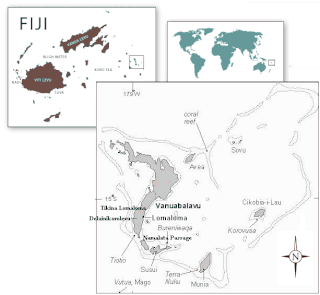
Turaga na Rasau is a traditional Fijian chiefly title of the Lau Islands. Prior to Fiji's colonial days, Fiji had many different Vanua with their own Paramount Chieftain which exercised no authority over the other; a saying from the island of Kadavu aptly summarises it "Nomu Turaga o sega na noqu Turaga" or "Your Chief is not my Chief" also the people of Beqa Island were of a similar opinion saying "Qali Cuva Ki Lagi" or "Subject only to heaven" and would bow to no outside Chieftain, but at the turn of the 20th century aspects of the traditional social structure remained, but for administrative purposes three main Matanitu were solidified and formed as they were the dominant consolidated powers at the time being that of Kubuna, Burebasaga and Tovata. With regard to the Rasau while its traditional origins were in Kubuna on Bau the titles traditional authority in modern Fiji is now in Tovata, Lau in particular Lomaloma Tikina on the Island of Vanua Balavu.
Taukei ni Waluvu is a Fijian phrase for "Owner of the Flood." It is the traditional chiefly title of the warrior hill clan Siko-Natabutale of Nairukuruku village. The history of the clan from the mid- nineteenth century, represent the social structures of the chiefly system, religion and western culture that supported colonialism in Fiji. Tradition, Christianity and British indirect rule were combined to legitimize what was accepted as the right way to govern. Condemned by some modern day critics as exploitative, the Fijian chiefly system was the medium of native social interdependence and a traditional contract shared by the indigenous clans of pre-colonial Fiji, that was utilized for colonial rule. Since Independence the chiefly system has had to adapt to the demands of modernity. Anthropologist Arthur Capell in his study of early tribal migration within Fiji made the point that, "the history of Fiji is the history of chiefly families." The phrase in fact emphasized the hierarchical nature of Fijian traditional society where chiefly power was held sacred. The relationship between Chiefs and Westerners in especially Missionaries thus became a focal point for gathering insight into Fijian culture and tradition in the nineteenth century. James Turner a latter anthropologist found, "The chiefly families of Nairukuruku were the first in the eastern highlands of Viti Levu to declare their allegiance to the central government and as a result of this support their influence expanded throughout the area".

Verata is a tikina in Fiji's Tailevu Province. It is made up of several sub-districts or Tikina makawa, namely: Verata, Namalata, Tai, Vugalei, and Taivugalei.

Charles Walker was a Fijian civil servant and Alliance Party politician and diplomat.

Viwa Island, Yasawa is located approximately 70 km northwest of Denarau situated in the Yasawa Islands of Fiji.
RatuMaculeku Rokocegu is a Fijian chief. The Paramount Chief of the Dreketi sub-district of Macuata Province, Rokocegu was involved in a mutiny at the Sukunaivalu Barracks in Labasa on 7 July 2000. Supporting the insurrection in Suva led by George Speight, rebels overran the Sukunaivalu Barracks, and also harassed Indo-Fijian civilians and led acts of civil disobedience within the surrounding area.

Navatu is a sub district in Cakaudrove; one of 3 provinces situated in Vanua Levu, the second largest island in Fiji. The sub-district, or "tikina" as it is known in the iTaukei language, comprises nine villages mainly occupying the eastern peninsular of the Natewa Bay. While Copra has been the main source of income for villages in the Navatu tikina, kava or yaqona is also becoming a fast growing commodity for villages within the Navatu sub-district.
References
- ↑ Naiker, Utkatu. "Local Government in Asia and the Pacific: A Comparative Study". Country paper: Fiji. UNESCAP. Archived from the original on 2013-11-03. Retrieved 2007-02-23.
- ↑ Lucas, Verona; Nauque, Setefano; Chandra, Sachin (2003). "Assessing Community Perspectives on Governance in Fiji" (PDF). RETA 6065. FSPI. Archived from the original (pdf) on May 29, 2006. Retrieved 2007-02-23.
- ↑ Boydell, Spike; Shah, Krishn (2003). "An inquiry into the nature of land ownership in Fiji" (PDF). The International Association for the Study of Common Property. Archived from the original (pdf) on 2007-06-07. Retrieved 2007-02-23.